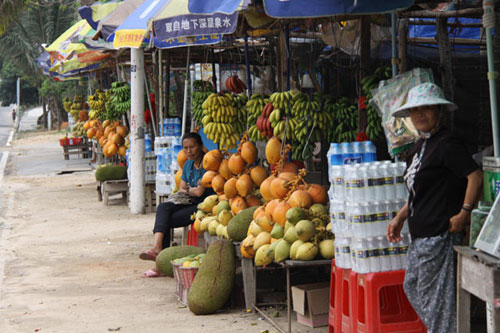The path to balance in Wanning
|
Local farmers sell fruit to tourists along the road connecting downtown Xing Long township to the Shimei Bay area. [Photo:CRIENGLISH.com] |
With a meandering coastline of 109 kilometers, Wanning city in south China's Hainan island is at the crossroads of its tourism development. The city's government started to develop local tourism as early as the 1950s, but the recent push to build Hainan into an international tourism island has finally brought Wanning into the light.
However, as the city quickened its pace in expanding the tourism industry, Wanning found itself juggling the resolve to attract external investments and the responsibility to protect the benefits of locals; the ambition to pull in more tourists and the urgent need to preserve its natural resources.
Jerry Eichholz from Canada who regularly comes to Xiong Long, a township under Wanning city, for a warm break from the winter weather sensed a particular change after the international tourism island policy took place.
"I saw a difference last January right away, as soon as the policy was announced. There was an immediate increase in buyers for property here," he observed. The Canadian was glad he and his Chinese wife bought a house in Xing Long last year now that prices have increased. He added that this year, the prices are more stable.
But tourism investment does not only cause spikes in property prices, it also offers locals more chances to make money.
According to Zhong Hongxia, director of the Wanning Tourism Administration, large numbers of Wanning natives are joining in tourism-related services or profiting from the influx of travelers.
"For example, along the roads close to scenic beaches, you can see farmers set up their own kiosks and sell fruit to tourists," said Zhong.
Huang Wen, once a fisher, has even grown a career of his hobby with the help of international tourists who surf in Wanning.
"I wanted to open a surfing school in the future, all my friends can be coaches," Huang said. A one-time fisher and employee of a small seafood restaurant in Wanning, his business card now reads: Huang Wen, surfing coach and founder of RiYue Bay Surfing Club.
His club provides accommodation for the numerous surfing enthusiasts who ride the waves of Wanning every September and October.
Jeremy Scott from Texas, United States, stays at Huang's place whenever he takes a surfing vacation. The English teacher, who works at a private school in northeast China's Shenyang city, said supporting locals is a very important part of his travels.
"It's nice for me to be able to go in there (downtown) as a tourist and know that my money is going to support local people."
Jeremy Scott's concern is the government's plan to prevent environmental damage in the course of tourism development.
"I like the tranquility (of RiYue Bay), the loudest things I hear in the morning are rosters and pigs," Jeremy explained. But he is confident in the Chinese government's ability to address the needs of environmental protection while promoting tourism.
"I think the Chinese government can do a good job of balancing the need for economic developments and bringing different areas of Hainan from one level to a higher level," Jeremy said.
"But I don't think five-star hotels are the way to go," he added, "If you do something that's very ecologically balanced, take care of ocean, takes care of the beach, but also allow for the sustainable development of the local economy, that would be good."
To ensure the preservation of Wanning's natural resources, the local tourism administration is tightening their grip on hotel and restaurant constructions.
"Before a company hands in any investment application, they should think of a plan to protect the environment first," Zhong, director of the local tourism administration said.
Sometimes tourism development and environmental protection are not contradictory, the tourism director suggested, as long as you sort out the priority.
Zhong revealed that the tourism administration of Wanning has just decided to not open the city's most precious vegetation -- the Vatica Forest -- to visitors.
With a recorded history dating back to 1901, the 14,000 acreage of lush Vatica trees shield Shimei Bay, Wanning's most famous beach resort, from the invasion of violent inland wind.
 0
0 








Go to Forum >>0 Comments